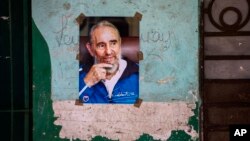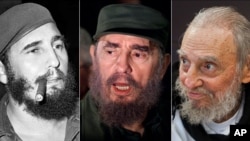Cuba’s former President Fidel Castro, who led the country for nearly 50 years, died late Friday in Havana. He was 90.
Cuban President Raul Castro, his younger brother, made the announcement on state television, he added that his brother’s remains will be cremated Saturday.
“Dear people of Cuba, with deep sadness I inform our people, the friends of our America and the world, that today, November 25 at 10:29 pm (0329 GMT) 2016, the commander and chief of the Cuban Revolution, Fidel Castro Ruz, died. His remains will be cremated. In the early hours of Saturday the 26th the organizing commission of funerals will provide more detailed information about the organization of the posthumous homage that will pay tribute to him, to the founder of the Cuban Revolution. To victory, always,” Raul Castro said.
Fidel Castro made Cuba the first communist country in the Western Hemisphere, after leading the Cuban revolution that overthrew the elected president, Fulgencio Batista, in 1959. And like Batista, who became a military dictator, Castro became a ruthless autocrat.
Castro governed Cuba as prime minister from 1959 to 1976, then as president from 1976 to 2008. He was branded a champion of socialism and anti-imperialism. Castro also served as the first secretary of the Communist Party of Cuba from 1961 until 2011.
Thousands fled Cuba
Tens of thousands people greeted Castro on the day he entered Havana, but thousands more fled the communist dictator’s repressive police state, leaving behind their families, their possessions and the island they loved. Many died attempting to reach the United States.
Under Castro, Cuba became a one-party communist state; industries and businesses were nationalized, and socialist reforms were implemented throughout society. Castro was criticized for suppressing human rights.
In a likely move to make a good impression on his American hosts during a visit to Washington in April 1959, Castro struck a moderate political tone.
A moderate tone
Speaking on NBC’s Meet the Press, Castro portrayed himself as a democrat who brushed off his revolutionary past.
“Democracy is my idea,” he said. “I [do] not agree with communists. ... What we want is to get as soon as possible the condition for free elections,” adding that the process would not take more than four years. It was a promise, he never fulfilled.
The United States restored diplomatic relations with Cuba, July 20, 2015, but has maintained the commercial, economic, and financial embargo against the communist island.
President Barack Obama, the first sitting U.S. president to visit Cuba since the Castro revolution, has moved aggressively, however, to also restore economic relations with the country, implementing a number of changes as recently as October 2016.





